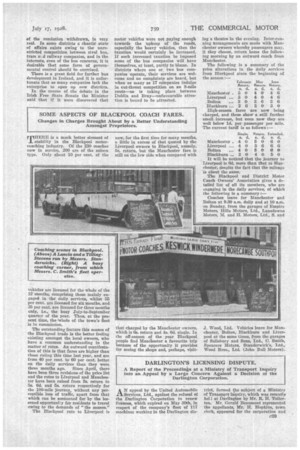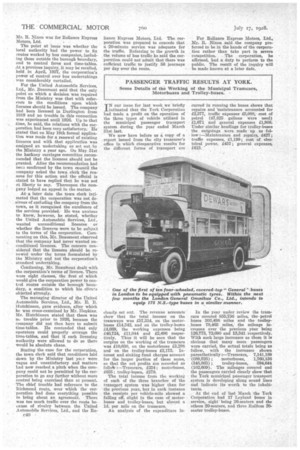DARLINGTON'S LICENSING DISPUTE.
Page 61

Page 62

If you've noticed an error in this article please click here to report it so we can fix it.
A Report of the Proceedings at a Ministry of Transport Inquiry into an Appeal by a Large Concern Against a Decision of the Darlington Corporation.
A N appeal by the United Automobile ..ti-Services, Ltd., against the refusal of the Darlington Corporation to renew licences, which expired on May 30th, in respect of the company's fleet of 117 machines working in the Darlington dis triet, formed the subject of a Ministry of Transport inquiry, which was recently hell at Darlington by Mr. R. H. Toilerton. Mr. Gerald Beaumont represented the appellants, Mr. H. Hopkins, town clerk, appeared for the corporation and
Mr. R. Nixon was for Reliance Express Motors, Ltd. .
The point at issue was whether the local authority had the power to fix routes worked by bus companies, including those outside the borough boundary, and to control fares and time-tables. At a previous inquiry, it may be recalled, held in April, 1927, the corporation's power of control over bus undertakings was considerably curtailed.
For the United Automobile Services, Ltd., Mr. Beaumont said that the only point on which a decision was required from the Ministry was that with reference to the conditions upon which licences should be issued. The company had been licensed in Darlington from 1019 and no trouble in this connection was experienced until 1926. Up to that -time, be said, the relations with the corporation had been very satisfactory. He stated that on May 19th formal application was made for a renewal of existing licences and with that application was assigned an undertaking as set out by the Ministry a year ago. On May 31st the hackney carriages committee recommended that the licences should not be granted. After the recommendation had been confirmed by the town council the company asked the town clerk the reasons for this action and the official is stated to have replied that he was not at liberty to say. Thereupon the company lodged an appeal in the matter.
At a later date the town clerk intimated that the corporation was not desirous of excluding the company from the town, as it recognized the excellence of the services provided.Ile was anxious to know, however, he stated, whether the United Automobile Services, Ltd., wanted unconditional licences or whether the licences were to be subject to the terms of the corporation. Cornmeriting on this, Mr. Beaumont observed that the company had never wanted unconditional licences. The concern considered that the licences should be renewed under the terms formulated by the Ministry and not the corporation's standard undertaking.
Oontinuing, Mr. Beaninont dealt with the corporation's terms of licence. There were eight clauses, the first of which . would-give the corporation power to Control routes outside the borough boundary, a condition to which his clients objected strongly.
The managing director of the United Automobile Services, Ltd., Mr. E. 11. Hutchinson, gave eviddiee, after which he was cross-examined by Mr. Hopkins. Mr. Hutchinson stated that there was nu trouble prior to 1926, because the company did not then have to submit time-tables. He contended that only operators could properly arrange the time-tables, and that if each licensing authority were allowed to do so there would be absolute chaos.
Stating the ease for the corporation, the town clerk said that conditions laid down by the Ministry last Yeer were vague and unsatisfactory and matters had now reached a pitch when the company could not be permitted by the corporation to go any farther without more control being exercised than at present. The chief trouble had reference to the Richmond route, over which the corporation had done everything possible to bring about an agreement. There was too much traffic over the route because of rivalry between the United Automobile Services. Ltd., and the Re.
c40
fiance Express Motors, Ltd. The corporation was prepared to concede that
20-minete service was adequate for the traffic. Referring to the growth in the volume of bus traffic he said the corporation could not admit that there was sufficient traffic to justify, 56 journeys per day over the route.
For Reliance Express Motors, Ltd., Mr. R. Nixon said the company preferred to be in the hands of the corporation rather than take part in severe competition. The corporation, he affirmed, had a duty to perform to the public. The result of the inquiry will be made known at a later date.












































































































